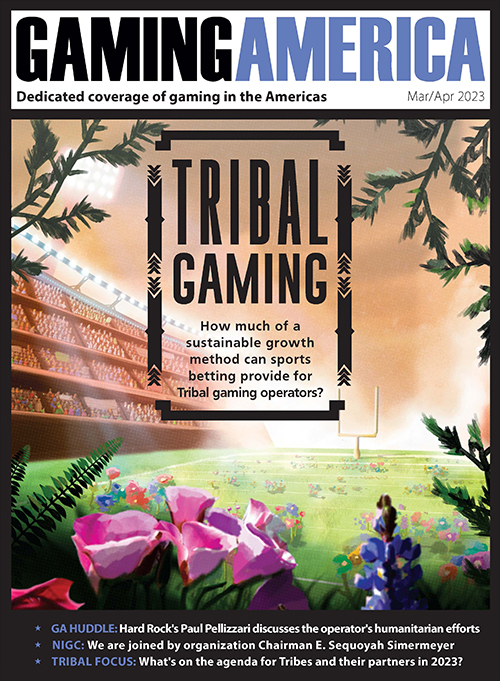
Following his appearance on the Huddle in 2021, Keith Whyte, Executive Director of the National Council on Problem Gambling (NCPG), discusses the NCPG’s new iGaming report. According to the body's independent research, a number of states are failing to meet the minimum standards with regards to helping players avoid,or combat, problem gambling.
How much did you enjoy ICE London this year?
Very much so, it was bigger than ever. There is a lot more energy about responsible gambling, which was nice. I can’t complain. I think I’ll start coming every year now.
Why are so many states failing to meet the minimum standard of responsibility for gambling?
I think part of it is ignorance, right? This is still a relatively new industry, and even though these standards were established in 2012 and we issued our first benchmarking report in 2013, many states are still fairly new to the business. The second major reason is that operators in general lobby for the lowest common denominator of standards, not the highest, which works to the detriment of those who are truly doing a good job on responsible gambling. When they allow their competitors to come in and fight for the lowest possible amount of regulation, it disadvantages the operators at the top because it leads to less responsible gambling standards, which hurts the sustainability and credibility of the entire industry.
New Jersey does have an argument because many of these standards have different time limits, and there are some judgment calls in the scoring. For example, New Jersey does not have a reinstatement process once an exclusion expires, but that’s because their exclusions don’t expire. There’s a lifetime exclusion, and if there are time-limited exclusions, they don’t expire until the patron asks to be removed. So, I think they’re certainly meeting the spirit of the standards, and we have to make a call. There’s always a little bit of subjectivity. Obviously, this leads us to think about iGaming.
Operators in general lobby for the lowest common denominator of standards, not the highest, which works to the detriment of those who are truly doing a good job on responsible gambling.
Sports betting is becoming huge – does that present more challenges for the NCPG?
The growth of online sports betting has been profoundly challenging for us. We are extending the assessment of online responsible regulations to all states with online sports betting. That’s a much bigger project, obviously, because in the past five years, it has grown to 36 or 37 states. It seems that all the low-hanging fruit is already done, so it’s a good time to assess the state of online sports regulations. We may find that, as we did on the online side, there are few leaders and many followers, resulting in weaker consumer protections and more harm to players; which is in nobody’s best interest.
Unfortunately, that’s what’s going to dominate the US market with fairly lax regulations around player protection. I think this will plant the seeds for the kinds of backlash that we saw in the UK and in many other jurisdictions that experienced rapid expansions of online betting. Are there certain states that worry us? Certainly. When we look at the weakest states in our report and other states like Arizona, which legalized sports betting without providing any additional sports betting tax revenue to prevent problem gambling, they may show up pretty low on our rankings of responsible protections. Colorado also chose to go into online gambling with very light regulation and had to change course due to enormous public backlash. They are still trying to get it right, so these are some of the states we’re looking at.
A lot of people are discussing where California is at right now. Does that present its own challenge in terms of scale?
California presents an enormous and challenging opportunity, because it is as big as something like the fifth-largest economy in the world and tends to drive US policy. For example, California’s car emission regulations rapidly became the default in the United States. While gambling works differently, many people are still watching California. Another interesting aspect of California is its referendum process, which lacks detail and does not provide the same level of clarity as legislative bills. Additionally, California has many stakeholders involved, including Tribes and portions of the existing industry. The failed referendum in California showed that legalizing gambling for the purpose of solving other issues is no longer acceptable. The industry should focus on legalizing gambling on its own merits and consider the good and bad aspects, including responsible gaming and public funding for problem gambling programs. Many operators make it hard for themselves to make a good case in California by not pushing for these standards. Most major operators in the US still work in markets where there is no public funding for problem gambling services, which makes it challenging to convince states like California to trust them to do business.
When a new state opens, is it a case of the more markets mature throughout the US, the more lessons are learned from failures across the board?
Yeah, I am reasonably optimistic that people will see an emerging consensus that you can mitigate costs and maximize benefits by promoting responsible gambling. I agree that there are good and bad examples on both sides. Some states have done it poorly, likely increasing the rate of gambling problems, while others have done it fairly well. I hope the positives outweigh the negatives – and that’s the job of the National Council: to mitigate the costs. We need partners to do that, and some companies in states are willing to work with us to do a good job, while others deserve criticism for not upholding their end of the bargain. When states are unwilling to look at gaming at first glance, because they’re so concerned about the problems that haven’t been addressed in some of these other jurisdictions, it can be a challenge.
When you guys came together in 2012 and published your first report in 2013, did you assess how regulations in the markets in other countries worked to form a base?
Our standards, developed in 2012, were based on best practices and heavily researched by the Responsible Gambling Council of Ontario. We also surveyed jurisdictions around the world and looked at the standards in other areas, before adapting them to fit the US market. I believe these standards have proven to be successful. The Division of Gaming Enforcement in New Jersey even incorporated these standards almost verbatim into their regulations because of their robustness. In the US context, these standards are absolutely fitting.
It’s never too late for a jurisdiction to update its regulations to comply, which is important for protecting consumers and also incentivizes the industry.
What are the NCPG’s goals for next year?
I think it’s threefold. First, we are going to extend the next issue of this report to cover all online sports betting states. It’s a big project, but I think it’s doable and important. Second, we will continue to advocate for legislators and regulators to fully adopt internet responsibility standards.
It’s never too late for a jurisdiction to update its regulations to comply, which is important for protecting consumers and also incentivizes the industry. Third, we’ll try to encourage casino and sports betting operators to utilize our Internet Compliance Assessment Program, which is a certification program that reviews platforms to ensure they meet our internet responsible standards. If an operator’s site passes our third-party compliance review, they can use our brand to show they meet the National Council’s best practices in responsible gambling. We’ve offered the program since 2015; and we hope the industry comes along.

